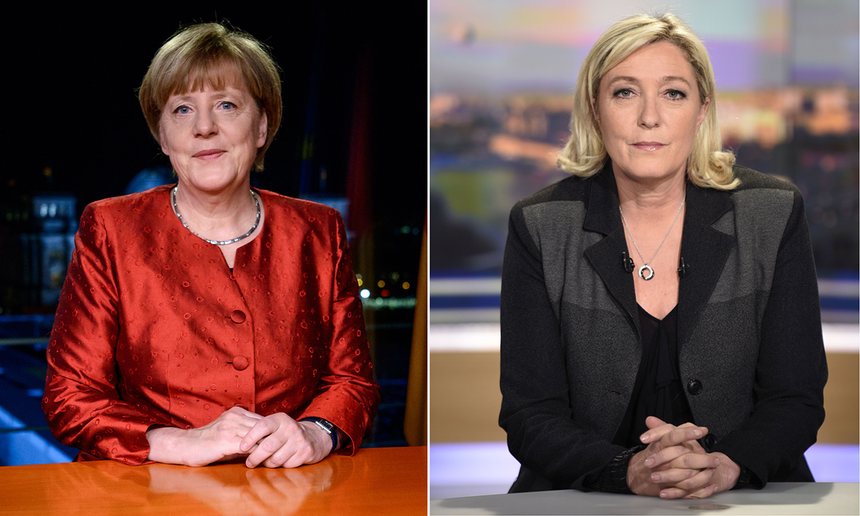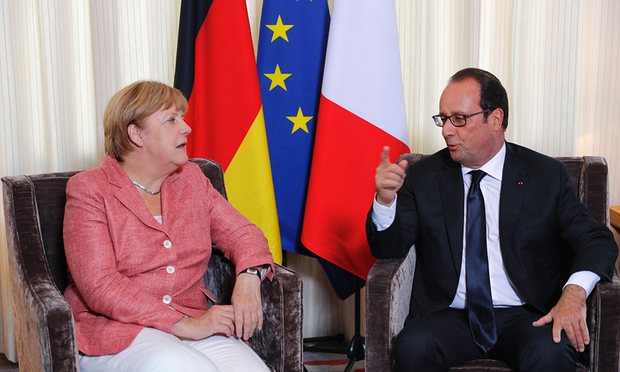Angela Merkel and Marine Le Pen: one of them will shape Europe’s future
September 2, 2016

The two women have fiercely conflicting visions, and their battle for the continent’s soul will be crucial
Two very different women hold Europe’s future in their hands – and neither of them is Theresa May. The battle for Europe’s soul is being waged between Angela Merkel and Marine Le Pen. This is a clash of personalities and visions: Germany’s chancellor v the leader of France’s Front National, the largest far-right party in Europe. As Britain prepares to leave the EU, the Franco-German dimension of the continent’s destiny has arguably never been so important since the end of the cold war. What is at stake is momentous: whether Europe can survive as a project, and whether fundamental principles such as the rule of law, democracy and tolerance can be salvaged. The battle will play out nationally in 2017, in key elections in France and Germany, but it concerns all Europeans.
It may seem strange to reduce Europe’s existential crises to just one personal confrontation. Merkel has been in power since 2005 and is trying to remain there, while Le Pen may dream of being in office but has never approached it (last year her party failed to take control of a single French region in local elections). Some may ask: why would a French opposition figure count more than the man currently sitting in the Elysée Palace? But François Hollande has become so weak – even more so with this week’s resignation of his economics minister, Emmanuel Macron – and terrorism has transformed French politics to such a degree that Le Pen’s prospects now stand out as a key defining factor of where France, and Europe for that matter, may be heading.
It is only partly reassuring to say that Le Pen has little chance of becoming president next year (the French electoral system makes that difficult). The trouble is, in recent months, her brand of anti-Muslim, xenophobic and nationalistic politics has spread across the French mainstream right like wildfire. Le Pen is fast capitalising on this summer’s burkini episode and on the national trauma left by jihadi terrorism. It’s hard to see which French politician or movement can find the authority and strength to push back against her ideas, or counter their appeal among the French suburban middle classes as well as in rural areas. Nicolas Sarkozy hopes to win primaries in November, but his whole strategy hinges on imitating rather than disputing Le Pen’s line of thinking.

‘Le Pen lashed out at Hollande, describing him as a subdued ‘vice-chancellor of Germany’, after he’d denounced populism in a speech.’ Photograph: Philippe Wojazer/AFP/Getty Images
Marine Le Pen’s single most powerful opponent is to be found outside France: Angela Merkel. Le Pen hates Merkel, and Merkel despises Le Pen. They confront each other in a fight of European proportions. Le Pen has often attacked the chancellor – once describing her as an “empress” imposing “illegal immigration” on the whole of Europe. Merkel sees Le Pen as an acute political threat to Europe, although she has rarely mentioned her in public. If France embraces the far right, the wider impact will be far more serious than it was with, say, Hungary’s illiberal slide.
Merkel and Le Pen have never met, nor have they had any reason to. Once, last year, they sat not far from each other in the European Parliament chamber – but Merkel kept her gaze away, out of contempt. That day, Le Pen furiously lashed out at Hollande, describing him as a subdued “vice-chancellor of Germany”, after he’d denounced populism in a speech.
These two women have one thing in common and one thing only: the depth of their political conviction. Angela Merkel has been unwavering in her message that welcoming refugees is the right thing to do; Le Pen fumes against “rampant Islamisation” of the continent. Merkel wants to save the European project; Le Pen is fully aligned with forces that want to dismantle it (she recently said on CNN that France had become an EU “province”). Merkel nurtures the transatlantic link; Le Pen admires Putin’s Russia – her party sits at the heart of pro-Kremlin networks in Europe, financial ones among them. Le Pen’s ideology draws from France’s historical far right, the ideas of Charles Maurras and colonial racism; Merkel is the daughter of a Protestant pastor for whom individual freedoms are paramount values. Le Pen has always made much about being divorced and smoking cigarettes (trying to cast herself in the image of a modern woman); Merkel’s personal style is more subdued, which isn’t to say her character is less ironclad.
For decades what drove the European project was the so-called “Franco-German engine”. It is now all but broken – mainly because of France’s economic weaknesses, which have severely unbalanced the relationship. What now drives European politics is a different kind of Franco-German equation, one in which Merkel, often faulted for her eurozone policies, has on several occasions attempted to give France’s socialist government some financial breathing space against Le Pen – including by sparing France the wrath of the EU commission for disrespecting deficit targets.
Merkel’s anti-Le Pen strategy has largely been discreet. But in May she made it very plain. Speaking at Berlin’s French lycee, she said she would try to make sure “other political forces are stronger than the Front National, if that can be accomplished from abroad”. It was an unusually blunt statement. Le Pen’s supporters immediately accused the chancellor of meddling in French politics; but Merkel has long identified the populist dynamics connecting Le Pen’s rise with the rise of Germany’s far-right AfD, a party that threatens to upend politics in her own country.
This coming Sunday, regional elections in Mecklenburg-Vorpommern offer a key test for Merkel’s CDU party, which has trailed in local polls behind the AfD. Le Pen will be watching closely, and little wonder: one of the two will shape the future of Europe. The question is which.


